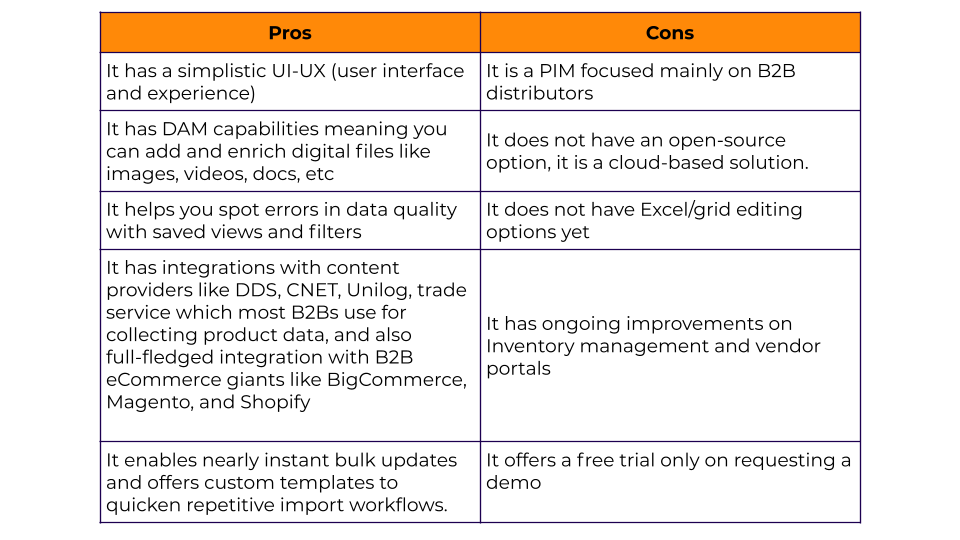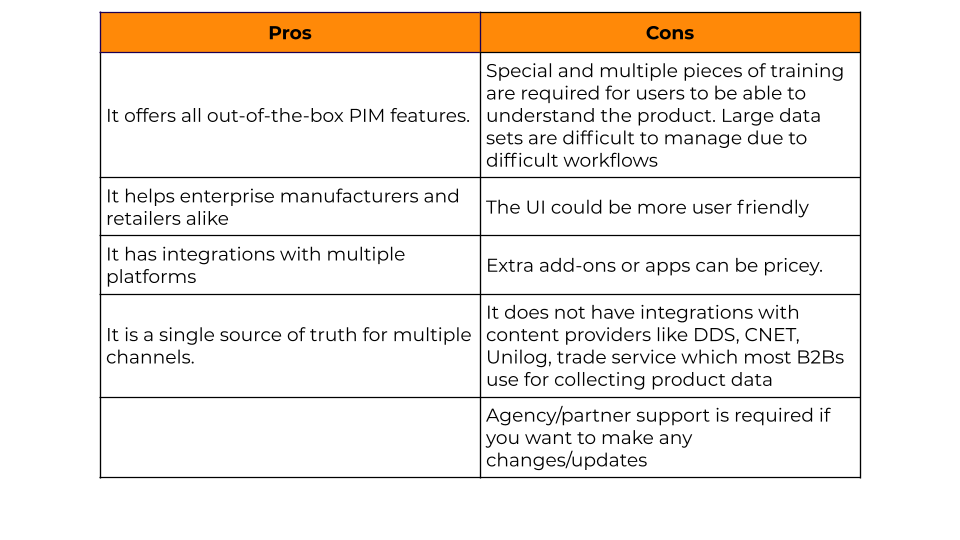Ecommerce isn’t coming, it is here. It took off like a rocket ship due to the recent pandemic. If you’re a B2B company that has moved your business online or looking to do so, you’re headed in the right direction. Businesses that provide high-quality content and a frictionless customer experience will survive.
Simply put, your online store should match the Amazon experience. It must allow your customers to search, consider, compare, decide, and pay in one place. For this, you require a solid back-end system to manage all the product information that will be seen in your store. A PIM tool will make this process a walk in the park.
Let us dive into the 6 best PIM tools for your B2B business and understand what a PIM is and what you can do with it. Here’s a quick overview of what’s to come which is divided into 3 main stages of understanding.
1. PIM Product Features
2. PIM Purchase Considerations
3. PIM Onboarding Difficulty/Experience
Contents
What is a PIM?
A PIM (Product Information Management) tool helps you collect product data from various sources like your ERP, spreadsheets, vendor portals, and the likes and provides a workflow to enrich it to make it marketing ready. Most PIMs in the market today offer all the basic PIM functionality with a difference in workflows to suit particular businesses like B2B, B2C or manufacturing, distribution, retailing, and so on.
What Can You Do With a PIM?
- De-silo your product information and have it all in one source of truth.
- Organize product data into categories thus aiding in creating systematic catalogs.
- Enrich your product information with images, videos, files, docs, product descriptions, variant data, and so on to support the eCommerce marketplace requirements.
- Export all of this enriched information to multiple marketplaces, sales points, print media, mobile, and even manage what information goes where from a single interface.
Most PIMs also allow you to manage multiple users and even restrict access based on user roles.
How Does This Benefit You?
- A PIM makes managing product content simple and allows you to focus on other tasks.
- It spares the employees the manual effort of managing data in spreadsheets.
- Your product content will be consistent across multiple channels.
- There will be no room for manual errors and you will have a system in place that helps you spot exceptions in data.
- Reduce the time to market with automation.
- Increase revenue with a better customer experience.
Why Is PIM Crucial For the Future of Ecommerce?
It is the foundation for a business to stand stable in an ever-changing digital environment. PIM eradicates the manual efforts of managing product information and provides quality product experiences at multiple channels that your millennial customers expect.
73% of those involved in B2B research and decision-making are millennials (age 25-39) (Harvard Business Review). Though B2B buying behaviors haven’t jumped a decade in a year, there have been notable shifts since the recent pandemic. Customers now have the time to research new technology and qualify vendors even before they talk to a sales rep. Therefore, the information vendors provide must reflect the product to best cater to their needs.
Why Use a PIM At All?
The PIMs available in the market today can help you collect, consolidate and enrich huge volumes of product data at once and send it over to multiple sales channels. B2Bs need to be ready to provide omnichannel experiences to their customers. This needs backing with products that have the
multichannel ability and well-managed data.
6 Best PIM Tools for Your B2B Business
Today we will be discussing the 6 best PIM tools for B2B businesses that are built with the B2B buying complexity in mind. Let’s get started.
1. DCKAP PIM – A Simple PIM Tool for B2B Distributors
DCKAP PIM is a flexible and simple SaaS-based PIM tool. It is built with attention to B2B distributors and their day-to-day problems with managing large sets of complex product information. It has different plans based on the needs of different business sizes-small, medium, or enterprise- namely, Standard, premium, and enterprise plans.
Pricing – Though the pricing isn’t visible on the website, we can share that it starts at as low as $2,400 annually.
2. inRiver – A Feature-Rich PIM for Enterprise Manufacturers
inRiver is a SaaS-based PIM solution built with manufacturers in mind. It has all the necessary PIM features which are either out of the box or add-ons. Users have said it is a high-end tool suitable for large companies with huge product offerings which justifies its heavy price tag.
Pricing- The website does not show the pricing upfront. From user feedback, we understand that it is $20000 and above annually.
3. Akeneo – An Open Source PIM for Large Enterprises
Akeneo is an open-source PIM built for huge enterprises. It has a free community edition along with paid growth and enterprise editions. Its open-source platform requires development help for onboarding and operation making it an expensive affair for small and medium businesses.
Pricing- Akeneo doesn’t display pricing on their website, but from user feedback, we know that their starting package is $25,000/year for Enterprise.
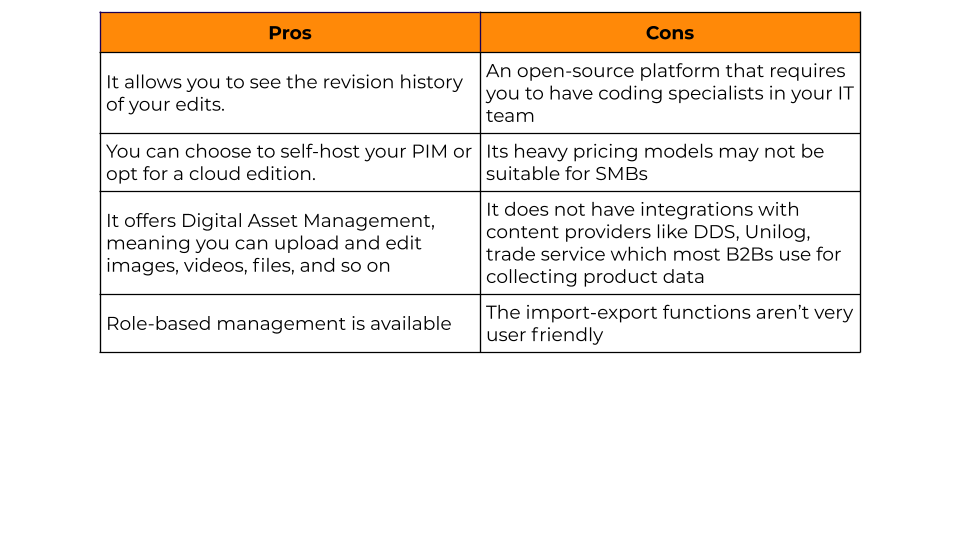 4. Salsify – A Cloud Based PIM for Brand Manufacturers
4. Salsify – A Cloud Based PIM for Brand Manufacturers
Salsify offers many features like PIM, PXM, DAM, and so on. A cloud edition with a whole lot of features in the PIM, Salsify’s customers reported having a complex user interface. Their PIM website says it is built for manufacturers.
Pricing- Salsify doesn’t show pricing upfront on its website. From user feedback, we know that their packages are $24000 and above annually.
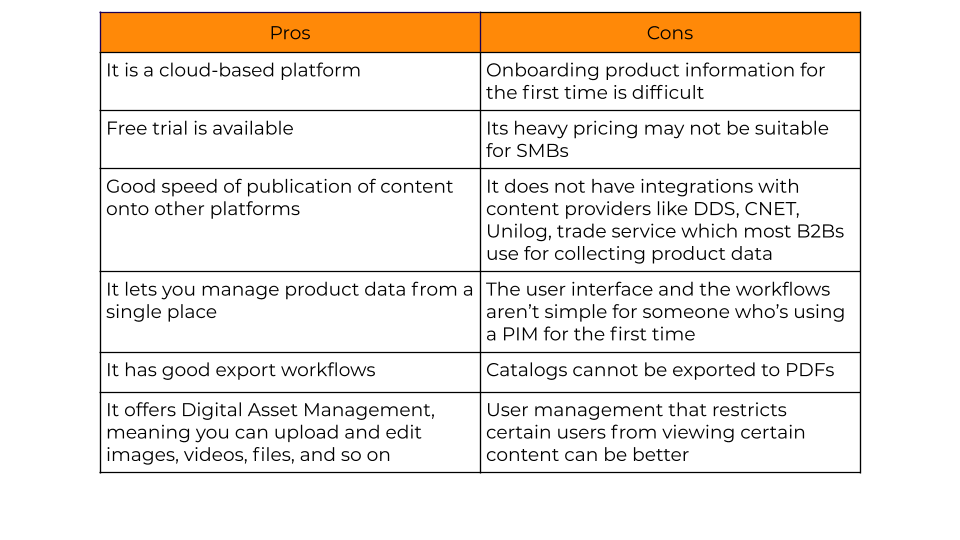 5. PimCore – An Open Source PIM for Techie Enterprises
5. PimCore – An Open Source PIM for Techie Enterprises
PimCore is an open-source platform for enterprises. It has a free community edition and paid enterprise and unlimited subscriptions. All PIM functions are available on a REST API, which can be relatively difficult for new developers to handle. It is suitable for large enterprises with complex requirements.
It is not suitable for SMBs who are on the lookout for an out-of-the-box solution (meaning a ready-to-use product).
Pricing- PimCore doesn’t give pricing on its website. We understood that it comes with an annual price tag of $24000 or more from user feedback.
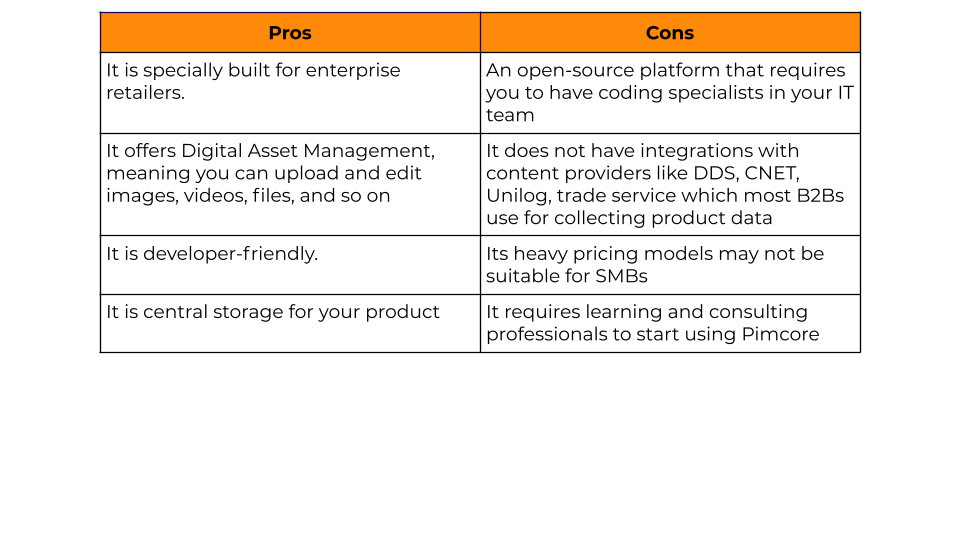 6. Plytix – A Growing PIM Tool for All Businesses.
6. Plytix – A Growing PIM Tool for All Businesses.
Plytix is a PIM tool that is built for businesses of all sizes. They do not have a free version, but they offer a free trial. It has a quite user-friendly interface. It is a product that is still in the stages of improvement. Users like the product for its simplicity but also have found a few limitations with features. Some users opine that data security can be better.
Pricing- It has the pricing listed on its website. Starter and Pro plans billed annually up to $13200 annually.
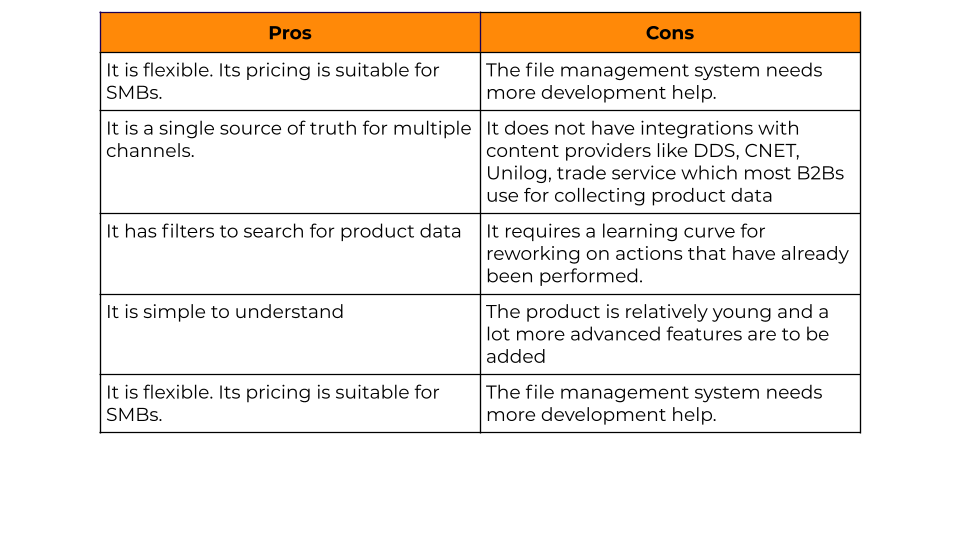 Conclusion
Conclusion
All of the above are the best PIM tools that have robust features catering to a specific audience. All of them are bound to give you an edge over others who aren’t using a PIM. Keep in mind that the PIM you choose should depend on the type of business you are in.
It is also crucial to know your technical (software development) strength if you choose an open-source platform. Cloud-based platforms rule out the coding effort required and can be more suitable to businesses that do not require too many customizations.
Be sure to ask for the time required for the implementation of a PIM for the volume of product data (SKUs) you have. From what we know, the implementation time for all the PIMs varies between 2-6 months depending on their workflows and how handy and structured your product data is. At DCKAP PIM that varies from 2-4 weeks. Faster implementation means faster deployment.
Also, ask for integrations and connectors that are readily available with the PIM solutions. If custom integrations need to be built be sure to ask for the time frame required.
DCKAP PIM is built to be simple even for non-tech savvy customers. Our product improvements are based on what our customers ask for. DCKAP PIM is the best PIM for small and medium distributors and we want to help solve your content management problems.
Don’t believe me though, try it for yourself. We’re just a click away 👇



